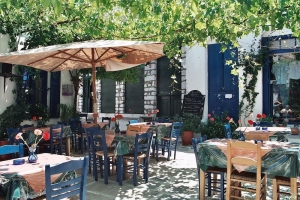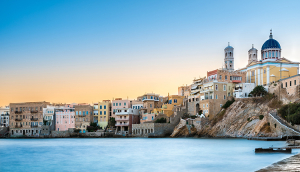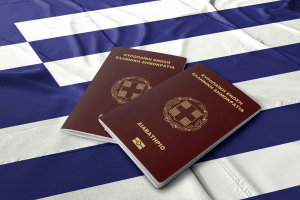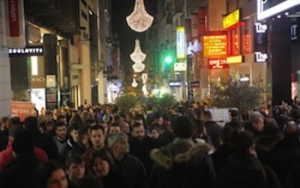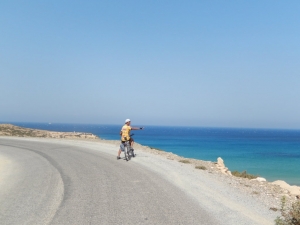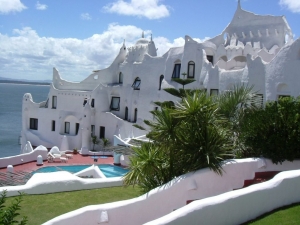WELLNESS HUB
XpatAthens
Athens’ Restaurants That Are Local Favorites
The Rise Of Digital Nomads
Digital Nomads
Check out Spaces' flexible workspace locations to find a base for your international team!
This content has been sponsored by IWG - an XpatAthens Brand Partner.
Syros Island Promoted Through A New Digital Campaign
Work Begins On Syntagma Square Makeover
The makeover is based on a plan adopted in light of the 2004 Summer Olympics.
For more information, please visit: ekathimerini.com
Greece Announces ‘Green Taxi’ Electric Vehicle Incentive
Transport Minister Costas Karamanlis presented the “Green Taxi” program during the 5th E-mobility Conference held in Athens this week. The decision is part of the government’s ongoing effort to accelerate the country’s transition to green practices beginning with the replacement of older, polluting vehicles, including private cars, taxis, and public transport, with newer, electric vehicles.
The “Green Taxi” program is funded by the EU’s RFF recovery tool and subsidizes the replacement of older taxis with fully electric vehicles. Karamanlis said funding could reach as much as 20,000 euros. At the same time, he said the government was moving forward with plans to install charging infrastructure at taxi stops.
Currently, there are 1,200 public charging stations available after the ministry entered a deal with the managing companies of the country’s highways, he said. The goal now is by 2025, to have developed a comprehensive network of 12,000 charging points to reach 25,000 across Greece by 2030.
Karamanlis said the government had already announced incentives for the purchase or lease of electric cars and motorcycles. Indicatively, he said, in 2021 a total of 6,967 electric cars were registered compared to 480 in 2019 with the market share going from 0.4 percent in 2019 to almost 7 percent last year.
“Today, according to official EU data, Greece is the EU country with the largest rate of change in the electric vehicle market,” he said.
To read this article in full, please visit: news.gtp.gr
Unlocking Ancient Wisdom: 5 Podcasts Every Greek History Lover Should Listen To
Claiming Greek Citizenship By Descent: What You Need To Know
Thinking about reconnecting with your Greek roots? Here’s a simplified breakdown of how you might be eligible for Greek citizenship by descent:
- Parental Heritage: If your mother or father is a registered Greek citizen, you qualify automatically.
- Born in Greece: If you were born in Greece and one parent held legal residency for at least five years before your birth, you're eligible.
- Out-of-Wedlock Birth: If your parents weren’t married, citizenship is granted through a Greek mother. If the father is Greek, legal proof of paternity is required.
- Adoption: Adopted by a Greek citizen before turning 18? You’re entitled to Greek citizenship.
- Third-Generation Greeks: If a grandparent was born in Greece or naturalized, you may apply—though your parent might need to claim citizenship first.
Your eligibility may also depend on when you were born and your parents' marital status at the time. To avoid pitfalls, consult Expat Law early on—accurate legal advice can save time and money.
Building Your Case: The Required Documentation
Once eligibility is confirmed, the next step is to secure your Certificate of Registration, the official record of your status as a Greek citizen. Here's what you'll need:
- Valid passport and birth certificate
- Christening/baptism certificate (if applicable)
- Passport-sized photo that adheres to official guidelines
- Your children's birth and baptism records (if applying for them too)
- Parents’ marriage certificate, indicating civil or religious union
- Parents’ and grandparents’ birth certificates (plus death certificates, if needed)
- Proof of Greek municipal registration
- Divorce or name change documentation (if applicable)
- Recent criminal record certificate
- Certified Greek translations of all documents
- Registration of foreign marriages in the Special Registry of Athens.
Once everything is in order, you will book an appointment with the Greek consulate closest to you and submit your application along with a €150 fee. Keep in mind, though, that processing may take up to two years, so plan ahead.
The Application Process
With documents in hand, you’re ready to submit your file to Greek authorities. A carefully assembled application boosts your chances of approval—every accurate document and form gets you closer to reclaiming your heritage.
The Perks of Greek Dual Citizenship
Greece allows dual nationality, meaning you don’t have to give up your existing citizenship. As a Greek citizen, you gain:
- The right to live and work in Greece and across the EU
- Access to Greek public healthcare and education
- Voting rights in Greek elections
But citizenship also comes with duties. Be sure to understand any tax obligations or, for male citizens, mandatory military service requirements.
Let Expat Law Guide You
The journey to Greek citizenship can be complex, but you don’t have to do it alone. Expat Law offers personalized legal support tailored to your unique background, including in-depth guidance for more complicated cases like asylum, deportation defense, and dual nationality.
Contact Expat Law here:
📧 kyveli@expatlaw.gr
📱 +30 694 555 1914 (call or text)
Have questions or need guidance tailored to your case? Don’t hesitate to get in touch—we’re here to help!
White Nights
Saturday night’s White Night (Leuki Nuxta) was a social/cultural experiment in the city. Stores in the centre (Ermou St. and surrounding areas) stayed open until 11:00 pm. There were performers and musicians, there were balloons, and there were people everywhere. Crowds and crowds of people…
It was fantastic! The feeling in the air was, quite simply, happy. It felt like Christmas, it looked like Christmas, it was the feeling of years gone by, when ‘crisis’ wasn’t the word of the day…
And let’s be clear, it wasn’t all about shopping or spending money (although it seems plenty did!). It was about being out with family and friends, going for a walk, checking out the windows, stopping for a bite to eat. Ok, this tends to happen a lot in Athens, but somehow Saturday night had a special quality about it…
The White Night also served to top-up some of the cash registers of the local businesses, just in time for Christmas. People are longing for crisis to be on the way out, and perhaps even the appearance of shopping at Christmas convinces us – for a brief moment - that this is true.
Judging by the subsequent news reports, the commentaries and the comments of people who were there, the White Night was a huge success. And not for the shops alone. People really enjoyed the undeniable electricity in the air.
The experience of that event has also apparently re-ignited the debate about Sunday shopping. It seems obvious now that the majority of Athenians actually enjoy being out and about and browsing the shops on Sundays, in between coffee stops (was that ever in question?!). Maybe the city will figure out rules for Sunday wages, and this thing can be settled for good.
Regardless, the ‘Leuki Nuxta ‘was really enjoyable. Not because I bought something (I didn’t), but more because of the great vibe and feeling in the crowd. It was a happy night in Athens!
Maybe the City of Athens will schedule something similar, say in June…?
With my very best wishes to all for a better and brighter 2014!
Until next week,
Jack
In this weekly space, keep up with ‘Jack’ as he navigates daily life in Athens… Anecdotes, stories, hits & misses, the good, the bad and, well, the rest…
Cycling On The Island Of Gavdos
Where is the most southern chunk of real estate in all Europe? Not Rhodes or Malta or Crete, and certainly not Sicily. To stand on the farthest south land in Europe you must make your way to the island of Gavdos, 170 nautical miles from Africa to the north and 22 nautical miles south of Crete’s feistiest region, Sfakia. “Oh my, it’s hot.” Those were my first words when I got off the boat.
Admittedly, we landed at one in the afternoon, but still, I had just spent several days cycling from morning to dusk in Crete, so even though I was accustomed to a mid-day sun, Gavdos was of another order.
The island is only ten kilometers long and five kilometers wide which makes it bikeable in its entirety in less than a day. The heat and hills probably account for why I didn’t see a single biker during my brief three-day sojourn. Many people walk where they need to go on the well maintained network of paths.
As of September 2014, Gavdos has no hotels, no banks, no ATMs, no post office, no nightclubs, no full time resident doctors. There is a heliport. There is one policeman for the 100 or so residents. I heard his car siren blare when he picked up his daughter from school. In the 1930s Communist political prisoners were exiled to Gavdos.
I stayed at Sarakinika, the beautiful beach settlement (it can’t possibly qualify as a village) where visitors can rent a smattering of rooms and eat in about a half dozen tavernas, some with wi-fi. Most folks like myself camped in tents in the coastal dunes amidst the pines trees and Juniperus shrubs less than a minute’s walk to the sea. I bathed in a rigged up shower on the beach with no curtains but no matter because nudity doesn’t raise eyebrows. My second shot at bathing was a bust because there was no water in Sarakinika which I’m told happens regularly.
As you may have guessed, many of the residents are hippies in retreat. I met Vasilis whose tall frame and long narrow beard evoked what I imagine Pythagoras to have looked like. Vasilis has lived on Gavdos in a tent for fifteen months. I guess he has had a full social calendar because he hasn’t even made it to Trypiti yet, which was the highlight of my visit. I met Antonio from Portugal who epitomized the permanent nomad with his tattoo sleeve and plugs in both ears the size of a one euro coin. His purpose in life seemed to be moving from one outdoor summer music festival to the next.

I wanted to sit on The Throne in Trypiti. This beach is the most southern point on Gavdos island. Where the gravel road stops is a path that takes thirty minutes walk downhill to reach Trypiti. At the beach’s most southern tip is a giant chair that faces north towards Europe. The local Russians built the chair and made the path. Their small community began with a nuclear physicist fleeing Chernobyl. They are scientifically attuned to ecological ways to live and they trade their skills for food and other needs. The locals appreciate them and their presence adds to the mystique and allure of Gavdos.
You’ve really got to have a low footprint to visit Gavdos. This is not a place for those expecting mints on their pillow, a pile of ice cubes for your ouzo or to buy a new pair of sunglasses. Gavdos is raw. It is a place where the nymph Kalypso is said to have imprisoned the shipwrecked Odysseus holding him as her lover. I suspect Gavdos has had its share of modern-day Kalypso and Odysseus wannabes.
By Colleen McGuire
Managing Director of cyclegreece.gr
Casapueblo - The Santorini Of Latin America
Located on a high rocky point jutting over the sparkling water in Punta Ballena, Uruguay, sits the Casapueblo, a magical sculptured hotel/museum that is often mentioned as the Greek island of Uruguay, or, the Santorini of Latin America.
It is the structure’s Cycladic-inspired architecture, combined with Punta Ballena’s amazing sunset view that makes it look like a small village on the island of Santorini in Greece.
The structure that is a short 15-minute drive from Punta del Este, was built by the famous Uruguayan artist Carlos Páez Vilaró. Today, it is a museum, art gallery, and hotel that welcomes thousands of visitors every year.
This complex looks like nothing else in South America. As you explore the winding cave-like corridors containing artifacts and unusual lighting, it gives you a mysterious feeling — and getting lost here is an entertaining experience. There are no room numbers on doors, since the hand-painted tiles on your key match your door tiles — each room is different.
To read more, please visit greekreporter.com
By Anastasios Papapostolou


